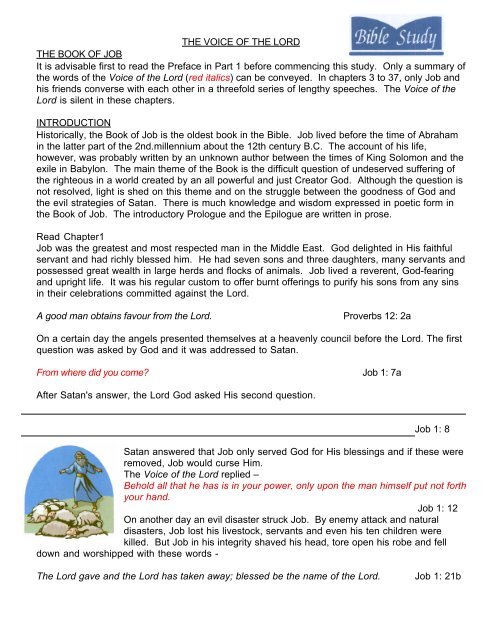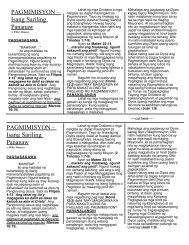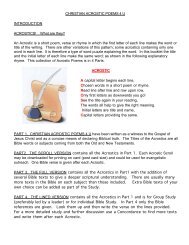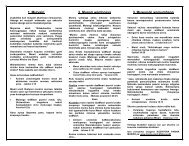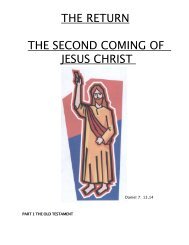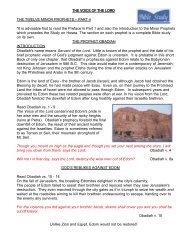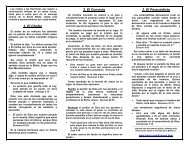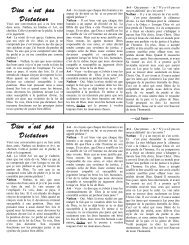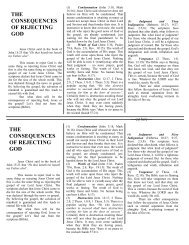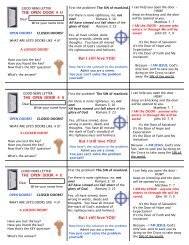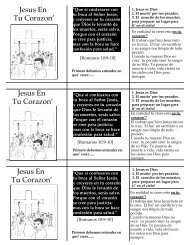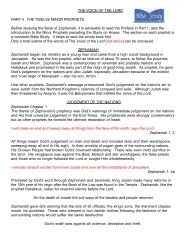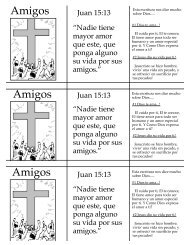You also want an ePaper? Increase the reach of your titles
YUMPU automatically turns print PDFs into web optimized ePapers that Google loves.
THE VOICE OF THE LORD<br />
THE BOOK OF JOB<br />
It is advisable first to read the Preface in Part 1 before <strong>com</strong>mencing this study. Only a summary of<br />
the words of the Voice of the Lord (red italics) can be conveyed. In chapters 3 to 37, only <strong>Job</strong> and<br />
his friends converse with each other in a threefold series of lengthy speeches. The Voice of the<br />
Lord is silent in these chapters.<br />
INTRODUCTION<br />
Historically, the Book of <strong>Job</strong> is the oldest book in the Bible. <strong>Job</strong> lived before the time of Abraham<br />
in the latter part of the 2nd.millennium about the 12th century B.C. The account of his life,<br />
however, was probably written by an unknown author between the times of King Solomon and the<br />
exile in Babylon. The main theme of the Book is the difficult question of undeserved suffering of<br />
the righteous in a world created by an all powerful and just Creator God. Although the question is<br />
not resolved, light is shed on this theme and on the struggle between the goodness of God and<br />
the evil strategies of Satan. There is much knowledge and wisdom expressed in poetic form in<br />
the Book of <strong>Job</strong>. The introductory Prologue and the Epilogue are written in prose.<br />
Read Chapter1<br />
<strong>Job</strong> was the greatest and most respected man in the Middle East. God delighted in His faithful<br />
servant and had richly blessed him. He had seven sons and three daughters, many servants and<br />
possessed great wealth in large herds and flocks of animals. <strong>Job</strong> lived a reverent, God-fearing<br />
and upright life. It was his regular custom to offer burnt offerings to purify his sons from any sins<br />
in their celebrations <strong>com</strong>mitted against the Lord.<br />
A good man obtains favour from the Lord.<br />
Proverbs 12: 2a<br />
On a certain day the angels presented themselves at a heavenly council before the Lord. The first<br />
question was asked by God and it was addressed to Satan.<br />
From where did you <strong>com</strong>e?<br />
<strong>Job</strong> 1: 7a<br />
After Satan's answer, the Lord God asked His second question.<br />
<strong>Job</strong> 1: 8<br />
Satan answered that <strong>Job</strong> only served God for His blessings and if these were<br />
removed, <strong>Job</strong> would curse Him.<br />
The Voice of the Lord replied –<br />
Behold all that he has is in your power, only upon the man himself put not forth<br />
your hand.<br />
<strong>Job</strong> 1: 12<br />
On another day an evil disaster struck <strong>Job</strong>. By enemy attack and natural<br />
disasters, <strong>Job</strong> lost his livestock, servants and even his ten children were<br />
killed. But <strong>Job</strong> in his integrity shaved his head, tore open his robe and fell<br />
down and worshipped with these words -<br />
The Lord gave and the Lord has taken away; blessed be the name of the Lord.<br />
<strong>Job</strong> 1: 21b
Read Chapter 2<br />
Again on another day when the angels presented themselves before the Lord, God asked the<br />
same question as before; with Satan giving the same answer.<br />
To the Lord's second question concerning His blameless servant <strong>Job</strong>, Satan answered that <strong>Job</strong><br />
would curse God if his life and body were afflicted. In Satan's first attack, only <strong>Job</strong>'s livestock,<br />
servants, and children were taken away.<br />
The Lord replied –<br />
<strong>Job</strong> 2: 6<br />
Satan then attacked <strong>Job</strong>'s health.<br />
In a painful illness of boils <strong>Job</strong> developed putrid sores all over his body.<br />
<strong>Job</strong> 2: 8<br />
<strong>Job</strong> still did not sin; although tempted by his despairing wife to curse the Lord and die.<br />
(Leviticus 24: 10 - 16)<br />
Read Chapter 3<br />
JOB'S FRIENDS<br />
<strong>Job</strong> 2: 10<br />
When <strong>Job</strong>'s three older friends heard about his changed circumstances, they came on a visit to<br />
sympathise with him in his extreme suffering. As they approached they did not even recognise<br />
<strong>Job</strong> for he was so disfigured.<br />
They wept, tore their robes and sprinkled dust on their heads as if in mourning.<br />
For seven whole days these aged wise men sat on the ground to <strong>com</strong>fort him without saying a<br />
word.<br />
In their visit and sympathetic silence <strong>Job</strong>'s friends must be <strong>com</strong>mended.
JOB'S COMFORTERS<br />
Chapters 3 - 37<br />
After that long silence, <strong>Job</strong> was the first to speak. His opening words were a lament for his<br />
suffering. He cursed the day of his birth. His physical condition and emotional suffering were so<br />
great that <strong>Job</strong> despised his life and just wanted to die.<br />
<strong>Job</strong>'s friends, Eliphaz (the first to speak), Bildad and Zophar, who came to console him, one after<br />
the other, began instead to rebuke him although <strong>Job</strong> pleaded for their understanding.<br />
In the cycle of speeches, his friends accused <strong>Job</strong> and argued that sin was the cause of his<br />
suffering; a chastening from the Lord Almighty.<br />
They urged him to repent. Speech after speech, their accusations became increasingly<br />
unsympathetic as these following words of Bildad indicate -<br />
<strong>Job</strong> 8: 20<br />
<strong>Job</strong> acknowledged God's almighty power and recognised that his life was sinful, but the degree of<br />
his present suffering was undeserved. This was <strong>Job</strong>'s reasoning throughout in his words to both<br />
his friends and the Lord God.<br />
In the debates <strong>Job</strong> strongly defended his position despite his physical weakness.<br />
<strong>Job</strong> 9: 2<br />
<strong>Job</strong> 10: 2<br />
<strong>Job</strong> 13: 3<br />
(<strong>Job</strong> 13: 4)<br />
<strong>Job</strong> had be<strong>com</strong>e impatient with his three friends and called them miserable <strong>com</strong>forters.<br />
(<strong>Job</strong> 16: 1)<br />
Today any unsympathetic friends are known as <strong>Job</strong>'s Comforters.<br />
JOB'S TRUST IN GOD<br />
Although <strong>Job</strong> did not understand that God had allowed Satan's attack for a higher purpose, he<br />
always maintained his trust in the Lord.<br />
Though He slay me, yet will I trust Him.<br />
<strong>Job</strong> 13: 15a<br />
<strong>Job</strong> 13: 18<br />
Likewise, <strong>Job</strong>'s friends did not know that God delighted in His loyal servant <strong>Job</strong>.<br />
<strong>Job</strong>'s terrible disasters were not punishment for his sins but a testing allowed by God leading to<br />
ultimate spiritual gain.
JOB'S PLEADINGS<br />
<strong>Job</strong> not only pleaded with his friends but also with God –<br />
* <strong>Job</strong>'s pleaded that his physical suffering should be taken away.<br />
* He pleaded to hear the Voice of the Lord.<br />
JOB'S REDEEMER<br />
As <strong>Job</strong> sought justice through the help of an advocate in heaven, he cried –<br />
. <strong>Job</strong> 13: 22<br />
For look! My witness is in heaven; there is one on high ready to answer for me. If only there were<br />
one to arbitrate between man and God, as between a neighbour and his friend.<br />
<strong>Job</strong> 16: 19, 21 N.E.B<br />
In those far off days there was no revelation of – Emmanuel (God with us) but <strong>Job</strong> in his speeches<br />
reached out to such an Emmanuel.<br />
Attacked both by Satan and his friends, <strong>Job</strong> was also no longer an honoured and a respected elder<br />
in his <strong>com</strong>munity. Even God was silent. <strong>Job</strong> felt deeply hurt and rejected.<br />
In his agony of body, mind and spirit, <strong>Job</strong> cried out –<br />
And <strong>Job</strong> wanted the following words written with an iron pen graven on stone.<br />
<strong>Job</strong> 19: 21<br />
Again <strong>Job</strong> expressed prophetically the future time when Christ would <strong>com</strong>e as Redeemer.<br />
<strong>Job</strong> 19: 25, 26<br />
PROSPERITY OF THE WICKED<br />
Chapters 20 - 23<br />
Zophar gave a lengthy account of the deeds of the wicked, that the wrath of God would certainly fall<br />
upon them and their joy would be short-lived. <strong>Job</strong> answered that this argument was false for the<br />
wicked often became powerful and prospered. Eliphaz, the most sympathetic of <strong>Job</strong>'s friends, in<br />
his last speech also accused <strong>Job</strong> of great wickedness and called upon him to return to the Lord.<br />
In reply, <strong>Job</strong> knew that if he could find God to state his case he would be acquitted.<br />
In <strong>Job</strong>'s speeches legal terms of a court room are evident.<br />
<strong>Job</strong> 23: 10
JOB'S LAST SPEECH<br />
Chapters 26 - 31<br />
In his last and lengthy discourse, as in earlier speeches, <strong>Job</strong> showed great understanding of the<br />
laws of nature in astronomical and geographical knowledge.<br />
<strong>Job</strong> 26: 7<br />
<strong>Job</strong> 26: 14<br />
Although <strong>Job</strong> acknowledged the wonders of God's power, he continued to state that the Lord had<br />
denied him justice. He was convinced that his friends wrongly accused him.<br />
Chapter 28: 12 - 28<br />
WISDOM POEM<br />
<strong>Job</strong> 28: 12<br />
The price of wisdom is above rubies.<br />
Nor can it be valued in pure gold.<br />
<strong>Job</strong> 28: 18b, 19b A.V.<br />
<strong>Job</strong> 28: 20<br />
<strong>Job</strong>'s beautiful and descriptive words of the Wisdom Poem close with the answer -<br />
<strong>Job</strong> 28: 28<br />
Chapter 29<br />
JOB'S MAINTAINS HIS INTEGRITY<br />
In contrast to the ways of the wicked, <strong>Job</strong> continued to defend his integrity, justifying himself in great<br />
detail.<br />
<strong>Job</strong> longed for that time when he had been happy with his sons and daughters around him and<br />
blessed by the Lord Almighty. As an honoured elder in the city gates, <strong>Job</strong> had cared for the poor<br />
and those oppressed by the wicked. His afflictions, however, had caused <strong>Job</strong> to be<strong>com</strong>e self<br />
righteous, expressing his many acts of kindness, good works and counsel in great detail.<br />
<strong>Job</strong> 29: 15
Chapter 30<br />
<strong>Job</strong> lamented his changed circumstances of loss, bereavement, illness and humiliation.<br />
He felt unjustly treated by Man and God; and when he cried to Him there was no answer.<br />
Chapter 31<br />
At the end of his last discourse, <strong>Job</strong> again strongly denied the accusations against him,<br />
maintained his innocence and loyalty to God.<br />
<strong>Job</strong> 31: 6<br />
The words of <strong>Job</strong> (with his friends) are ended.<br />
<strong>Job</strong> 31: 40b<br />
Chapters 32 - 37<br />
ELIHU<br />
<strong>Job</strong> was now silent and also his three friends when Elihu began to speak. As a younger man,<br />
Elihu had respectfully waited during the long debates. He alone addressed <strong>Job</strong> personally by<br />
name. Elihu was angry with <strong>Job</strong>'s friends because they condemned <strong>Job</strong> but were unable to<br />
repudiate his arguments. He was angry with <strong>Job</strong> for he justified himself and not God. Unlike the<br />
older counsellors, Elihu based his criticism on <strong>Job</strong>'s own words, for he had said -<br />
I am clean, without transgression; I am innocent, neither is there iniquity in me.<br />
<strong>Job</strong> 33: 9<br />
However, Elihu misquoted him, for <strong>Job</strong> did recognise his life was sinful but that the degree of his<br />
suffering was undeserved. <strong>Job</strong> wanted to know the sins for which he was accused.<br />
(<strong>Job</strong> 7: 21, 13: 23, 26)<br />
Elihu also rebuked <strong>Job</strong> concerning his <strong>com</strong>plaint about God being silent. <strong>Job</strong>'s actual <strong>com</strong>plaint<br />
was that God gave no answer in his present suffering. Elihu desired <strong>Job</strong> to repent and be<br />
forgiven. Like the three older counsellors, Elihu also did not realise that God delighted in His<br />
servant <strong>Job</strong> and was confident in his loyalty under Satan's attacks.<br />
Elihu, zealous for God's glory, stated – <strong>Job</strong> speaks without knowledge. <strong>Job</strong> 35: 16<br />
The phrase speaks 'without knowledge' is used by the Lord in His discourse (38: 2) and by <strong>Job</strong> in<br />
his response (42: 3).<br />
In Elihu's last and fourth speech, he uplifted God's goodness and His glory in Creation; also His<br />
justice in rewarding the righteous and punishing the sinful. The latter is contrary to the words in<br />
<strong>Job</strong>'s speeches for he expected to be vindicated. (<strong>Job</strong> 13: 18)<br />
THE VOICE OF THE LORD<br />
Chapters 38: 1 - 41: 34<br />
The Voice of the Lord speaks to <strong>Job</strong> out of the storm.<br />
The Lord's two discourses are continuous except for a brief response from <strong>Job</strong>. (40: 3 - 5)<br />
<strong>Job</strong> 38: 2, 3
GOD'S QUESTIONS<br />
The Lord proceeded to ask <strong>Job</strong> many rhetorical questions, both inanimate and animate, to which<br />
<strong>Job</strong> had no answer.<br />
<strong>Job</strong> 38: 4<br />
Have you <strong>com</strong>manded the morning since your days began<br />
and caused the dawn to know its place? <strong>Job</strong> 38: 12<br />
<strong>Job</strong> 38: 16<br />
Can you bind the chains of the cluster of stars called Pleiades<br />
or loose the cords of the constellation Orion?<br />
<strong>Job</strong> 38: 22<br />
Can you lead forth the signs of the zodiac in their season?<br />
Or can you guide the stars of the Bear with her young?<br />
<strong>Job</strong> 38: 31, 32<br />
<strong>Job</strong> 39: 19<br />
Moreover the Lord said to <strong>Job</strong>,<br />
<strong>Job</strong> 39: 27<br />
<strong>Job</strong> was utterly humbled and found no words to answer.<br />
<strong>Job</strong> 40: 2<br />
Again out of the storm the Lord spoke to <strong>Job</strong> as before. (<strong>Job</strong> 38: 2, 3)<br />
<strong>Job</strong> 40: 7<br />
Will you also annul (set aside and render void) My judgement?<br />
Will you condemn Me (your God) that you may appear righteous and justified?<br />
Have you an arm like God? Or can you thunder with a voice like His? <strong>Job</strong> 40: 8, 9
BEHEMOTH<br />
<strong>Job</strong> 40: 15<br />
The Lord asked <strong>Job</strong> many questions concerning this large and powerful creature.<br />
<strong>Job</strong>: 40: 24<br />
Leviathan is identified as the crocodile. <strong>Job</strong> 41: 1 - 34<br />
LEVIATHAN<br />
No one dares stir up the crocodile;<br />
who then is he who can stand before Me (the beast's Creator)?<br />
Whatever is under the whole heavens is Mine. <strong>Job</strong> 41: 10,11b<br />
Read <strong>Job</strong> 42: 1 - 6<br />
<strong>Job</strong> replied that he had spoken unwisely of things he did not understand –<br />
<strong>Job</strong> 42: 5, 6<br />
Like <strong>Job</strong>'s three friends who had no more words to say, <strong>Job</strong> was now silent in awe of the LORD<br />
Almighty.<br />
Satan also had been silenced.
<strong>Job</strong> 42: 7 - 17<br />
EPILOGUE<br />
The Lord then addressed <strong>Job</strong>'s three older friends - but not Elihu.<br />
You have not spoken of me the thing that is right, as My servant <strong>Job</strong> has.<br />
Offer up for yourselves a burnt offering; and My servant <strong>Job</strong> shall pray for you, for I will<br />
accept his prayer that I deal not with you after your folly.<br />
<strong>Job</strong> 42: 7b, 8b<br />
When <strong>Job</strong> had prayed for his friends, the Lord restored his former prosperity with a double<br />
blessing!<br />
He came to possess twice as many animals and once again was blessed with seven sons and<br />
three daughters.<br />
JOB'S DAUGHTERS<br />
His daughters grew up to be the most beautiful in the land.<br />
<strong>Job</strong> gave them beautiful names and equal rights of inheritance with their unnamed seven<br />
brothers.<br />
Their descriptive names may reflect <strong>Job</strong>'s suffering and his deep experience of God causing him<br />
to see the LORD and repent in dust and ashes.<br />
Jemimah means dove - a sign of God's spirit of peace given to <strong>Job</strong>.<br />
Keziah means cinnamon, a spice - the fragrance of God in <strong>Job</strong>'s life<br />
restored after his illness of putrid bodily sores.<br />
Keren Happuch means antimony, an expensive eye shadow making<br />
eyes appear larger and more luminous.<br />
Eyes of faith were important to <strong>Job</strong> for he had declared during his suffering –<br />
And after my skin, even this body, has been destroyed, then from my flesh shall I see God.<br />
<strong>Job</strong> 19: 25, 26<br />
On hearing the Voice of the Lord speaking out of the storm (though <strong>Job</strong> did not receive a specific<br />
answer) his eyes of faith were truly opened. After his humble repentance, <strong>Job</strong> could see God's<br />
supreme sovereignty, goodness and justice. <strong>Job</strong> previously had only heard of God but now, in<br />
worship, his spiritual eyes saw the Lord.<br />
(<strong>Job</strong> 42: 5)<br />
<strong>Job</strong> 42: 16
CONCLUSION<br />
The poetic book of <strong>Job</strong>, so full of words of wisdom, continues to be a strength and solace to<br />
suffering souls today including the terminally ill. Its words speak to the deepest needs of the<br />
human heart. The words of <strong>Job</strong>'s friends only caused disagreement and despair. The words of<br />
God out of the whirlwind, by contrast, led to <strong>Job</strong>'s repentance, worship, peace of mind, prayer for<br />
his friends and God's double blessing. <strong>Job</strong> had maintained his faith in God throughout his time<br />
of tragic suffering. The righteousness of <strong>Job</strong> is referred to by the prophet Ezekiel and the<br />
endurance of <strong>Job</strong> is <strong>com</strong>mended in the Epistle of James.<br />
Ezekiel 14: 14, James 5: 11<br />
Although <strong>Job</strong> had heard of God, It should be noted that <strong>Job</strong> had no knowledge of the lives of the<br />
Patriarchs or the Prophets. He had never heard the words of the promised New Covenant<br />
prophesied by Jeremiah, who also greatly suffered.<br />
(Lamentations 3: 1 - 23)<br />
In the Hebrew scriptures, there are other verses that point to Christ as Advocate in heaven and as<br />
the Redeemer from sin - sent by God to destroy the works of the devil. <strong>Job</strong> had no knowledge of<br />
the limitless love of the Saviour as recorded in the New Testament. Only the Lord Jesus Christ,<br />
the Friend of sinners Who suffered and died on the Cross, could have answered <strong>Job</strong>'s questions<br />
about his undeserved suffering with such <strong>com</strong>forting words as these -<br />
Come to Me .....<br />
Matthew 11: 28 - 30<br />
NOTICE OF COPYRIGHT<br />
‘Scriptures taken, unless otherwise stated,<br />
from THE AMPLIFIED BIBLE,<br />
Old Testament copyright, © 1965, 1987<br />
by The Zondervan Corporation.<br />
The Amplified New Testament copyright © 1958, 1987<br />
by the Lockman Foundation. Used by permission.'


